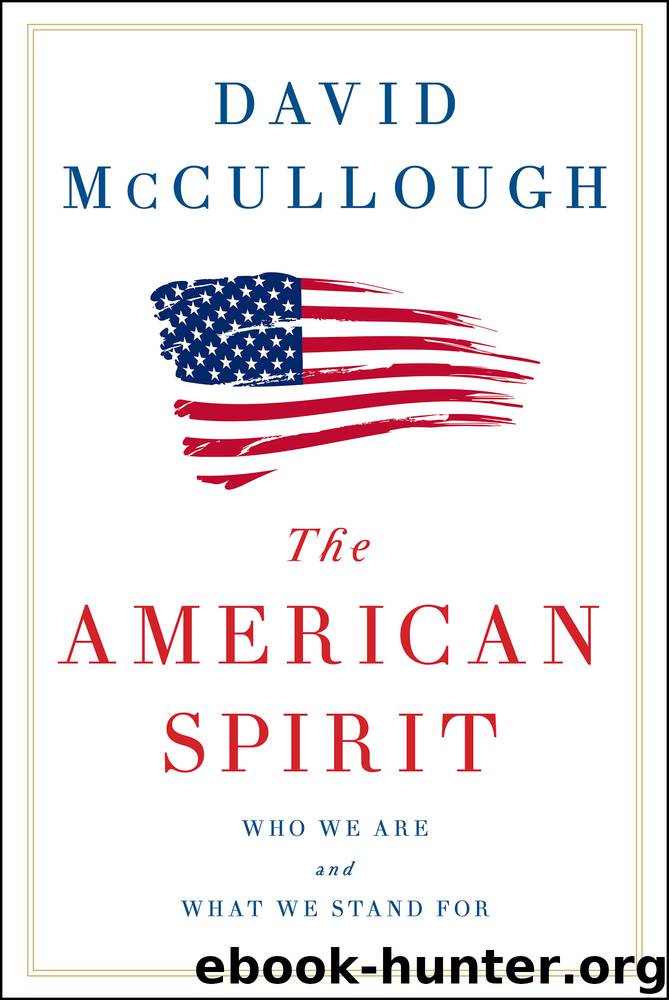The American Spirit by David McCullough

Author:David McCullough
Language: eng
Format: epub
Publisher: Simon & Schuster
And yet at the close of her long days there on the farm in Braintree, at maybe 10:00 or 11:00 at night, Abigail Adams would sit by the fire at her kitchen table, take up a quill pen, and write some of the most thoughtful, telling letters by any American of the time.
The house is still there. It is the house she lived in as a bride and through all the years of the Revolution when John Adams was off serving the country. Their first son, John Quincy Adams, our sixth president, was born there. And when you go there, you will be moved by how small it is. And how sturdy. Next door is the very similar house where John Adams was born. There they stand, two plain, solid New England saltboxes by the side of the road. The third Adams house, the much larger Old House, as it’s called, is the house John and Abigail moved into after their return from diplomatic service in Europe in 1788.
And then there’s the magnificent house they lived in in Paris. There is the house where Adams lived in Amsterdam and in which he very nearly died of fever while securing vitally needed loans from the Dutch during the Revolution.
The house where he and Abigail lived in London, when Adams was our first ambassador to the Court of St. James’s, also still stands: the last eighteenth-century house on Grosvenor Square. Talk about buildings redolent with history! Thomas Paine, Thomas Jefferson, Charles Bulfinch, Benjamin West, John Trumbull all came and went.
We can find Adams and Jefferson in Philadelphia still. We can find Adams, Patrick Henry, George Washington, Paul Revere in Carpenters’ Hall and in Independence Hall, the Powell House, and old Christ Church. And we can find the Adamses in the White House—they were the first to occupy the White House. All these buildings, these American places, all are tangible, real, evocative expressions of those distant times and those extraordinary people. And those people are here, with us, in a way they would not be if those structures were gone.
Imagine if there were no historic buildings, if there were few or no historic places. Imagine how it would be if there were no Gettysburg battlefield, no Brooklyn Bridge, no Faneuil Hall, no Panama Canal, no Kitty Hawk. The list could be very long. Each and every one could have been swept away, destroyed, heedlessly like so much else.
We Americans say, “What’s new?” Nobody ever greets you saying, “What’s old?” (Well, maybe preservationists do!)
We think we live in difficult uncertain times. We think we have worries. We think our leaders face difficult decisions. But so it has nearly always been.
When John Adams went off to Philadelphia in 1774, he knew, as the other delegates knew, that only the previous year more than three hundred people had died in the city of smallpox.
Nor was there any certainty of success, or any groundswell of popular support. Had they taken a poll in Philadelphia in 1776, they would have scrapped the whole idea of independence.
Download
This site does not store any files on its server. We only index and link to content provided by other sites. Please contact the content providers to delete copyright contents if any and email us, we'll remove relevant links or contents immediately.
| Archaeology | Essays |
| Historical Geography | Historical Maps |
| Historiography | Reference |
| Study & Teaching |
Underground: A Human History of the Worlds Beneath Our Feet by Will Hunt(11256)
Navigation and Map Reading by K Andrew(4553)
Sapiens by Yuval Noah Harari(4537)
Barron's AP Biology by Goldberg M.S. Deborah T(3631)
The Sympathizer by Viet Thanh Nguyen(3479)
5 Steps to a 5 AP U.S. History, 2010-2011 Edition (5 Steps to a 5 on the Advanced Placement Examinations Series) by Armstrong Stephen(3406)
Three Women by Lisa Taddeo(2920)
The Comedians: Drunks, Thieves, Scoundrels, and the History of American Comedy by Nesteroff Kliph(2790)
Water by Ian Miller(2582)
Drugs Unlimited by Mike Power(2192)
DarkMarket by Misha Glenny(1847)
The House of Government by Slezkine Yuri(1844)
The Library Book by Susan Orlean(1737)
A Short History of Drunkenness by Forsyth Mark(1720)
Revived (Cat Patrick) by Cat Patrick(1678)
The Woman Who Smashed Codes by Jason Fagone(1649)
The House of Rothschild: Money's Prophets, 1798-1848 by Niall Ferguson(1618)
And the Band Played On by Randy Shilts(1615)
Birth by Tina Cassidy(1572)
